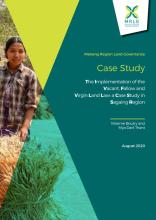/ library resources
Showing items 1 through 8 of 8.This Case Study looks at the implementation of the Vacant, Fallow and Virgin Lands Management Law (VFV Law) in seven villages in Sagaing Region, to assess the practices on the ground and how the law impacts the land tenure security of smallholder farmers.
Water- and land-related resource conflicts are the starting point of the Zambian nexus study. Zambia is endowed with abundant land and water resources, the utilisation of which offers huge potential for the country’s economic development.
Palm oil production is currently the focus of much contentious debate. On the one hand, palm oil production has a substantial, positive (socio-) economic impact in countries which produce it, like Indonesia, and is a powerful engine of rural development.
Irrigation can help to improve and stabilise agricultural productivity, thereby contributing to food security and to resilience against climate change.
In the Mekong region, conflicts between local communities and large scale land concessions are widespread. They are often difficult to solve.
This dialogue provided a way for the land community to collaboratively explore challenges and opportunities related to the recognition of indigenous, ethnic minority and customary tenure rights in the Mekong region in order to:
This short thematic study challenges the assumption that the legal framework to recognize and protect indigenous peoples’ (IP) customary lands is adequate and that the challenge lies in its implementation.
This short thematic study challenges the assumption that the legal framework to recognize and protect indigenous peoples’ (IP) customary lands is adequate and that the challenge lies in its implementation.
Land Library Search
Through our robust search engine, you can search for any item of the over 73,000 highly curated resources in the Land Library.
If you would like to find an overview of what is possible, feel free to peruse the Search Guide.






